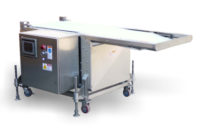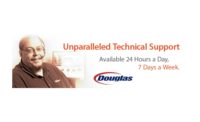Machine Driven
By Barbara Young
Editor-In-Chief
Editor-In-Chief
Whenpush comes to shove, internal mechanisms count mightily, such as devices with moving parts that serve as the innards of processing equipment and systems.
Pumps, motors, and gear drives may be moving up the attention chain, as meat, poultry, and prepared food production managers seek to keep plant-floor equipment in good condition and able to withstand harsh environments defined by temperature, cleaning, and sanitation requirements.
To be sure, out of sight should not mean out of mind concerning the internal mechanisms of processing equipment. Such machine components are more than mere parts — they are vital internal organs. Moreover, progressive suppliers of such components know they must deliver solution-driven devices designed to accommodate specific industry applications.
The sum of machine parts: potentials and benefits
South Dakota-based Hub City, a subsidiary of Regal-Beloit Corp., characterizes itself as an operation offering “the ultimate food processing and wash-down solutions” in a line of stainless steel gear drives and mounted bearings. Meanwhile, Leeson Electric Corp., in Wisconsin and another division of Regal-Beloit, specializes in AC and DC motors and electric drives, mechanical gear drives, and sub-fractional horsepower motors and gearmotors.
To be sure, applications run the gamut concerning plant-floor processing equipment and systems, ranging from vacuum-packaging pumps to vacuum tumblers to forming and slicing machinery. Vacuum pumps are considered the “engine” in packaging machines, for example. Moreover, design material used in the manufacture of machine parts is an even more critical issue in the age of heightened food-safety awareness and concern. To that end, parts manufacturers are developing product lines specifically designed to handle harsh environments commonly requiring salt water and caustic wash practices.
Hub City’s line — featuring universal designs and easy adaptability to structural patterns of a range equipment — reach customers in the meat and poultry processing arena first through machinery and equipment manufacturers offering stainless steel solutions.
“The second channel of approach to the marketplace is to present the benefits of our gear drives and mounted bearings to equipment users for maintenance and replacement opportunities,” explains Alton Vilhauer, marketing coordinator, adding that a broad network of distributors nationwide and in Canada specialize in servicing the MRO (maintenance, repair, and operations) market.
Although Leeson’s wash-down duty motors and gear reducers target customers using replacement parts in the meat protein-processing arena, the company also caters to OEM (original equipment manufacturers) builders of machines used in meat, poultry, and seafood plants. Moreover, as Max Marti, stock products manager, explains, Leeson also deals with distributors who supply MRO requirements to processing plants and system integrators operating as hybrid/OEM distributors of turnkey systems.
“Primary design features necessary to meet the needs of current processing environments depend on the level of severity of the wash-down process and sanitary requirements,” Marti reports. “Our products shed water like a duck at home in wet environments.”
Marti recommends white epoxy motors for equipment requiring fewer washdowns overall or else subjected to infrequent exposure to caustic substances. Stainless steel components, although more costly, offer higher levels of protection in caustic environments. Moreover, aluminum alloy pump vanes are offered as an alternative to those developed from plastic.
Engineering solutions for optimizing processing performance
Depending on the nature and extent of new design concepts or product improvements, Marti says Leeson may partner with a customer to perform beta testing replicating actual industry applications. “We make sure designs are robust and acceptable to customers,” he adds. “As new standards are adopted by the industry, Leeson evaluates the requirements to determine if existing products need changing or if new ones are required. As new technologies become available, they are evaluated to see if they add to the performance of existing products.”
When tougher new coatings hit the market, Leeson changed certain parts specifications to take advantage of the improvement. Seals, gaskets, conduit box mountings, and breathers have encountered similar performance upgrades.
Square pegs and round holes are not designed to perfectly fit together. The same thing may apply to equipment fittings as it relates to interchanging machinery parts.
To keep equipment functioning at peak conditions, parts manufacturers recommend periodic checkups and replacement of certain key components to ensure maximum equipment life.
“It is important to use original filters supplied by the manufacturer because they comply with original design specs and work with the pressure levels in the pump,” explains Terry McMahon, director of marketing, Busch Inc. “Using replicated filters, not manufacturer supplied, may plug sooner than they should or they may not be properly designed to work with low-pressures.”
McMahon also points to a threat of pressure drops by using the wrong filter.
“They will reduce the performance of the pump and shorten the period before rebuild or replacement is required,” he continues. “Non-genuine exhaust filters may also spit oil or have excessive oil carryover in the exhaust gases.”
In line with engineering solutions, McMahon stresses the importance of a range of pump sizes to meet “the deep vacuum levels and capacity required for packaging at increasing line speeds.”
For its part, Hub City configured its geardrives and mounted bearings to offer a range of food-safety solutions. Exterior surfaces self drain and are designed to avoid entrapment of soil and foreign material. There also are no areas that support the breeding of bacteria, fungi, mold, and or other microorganisms. All exterior surfaces are smooth and easily cleaned allowing for cleaning in place or manual cleaning processes.
“The design of this superior product evolved from facility inspections and design input from a number of major food, meat, produce, and pharmaceutical processors,” Vilhauer explains. “The acquired data was integrated with hygiene requirements for the design of meat and poultry processing equipment. These resources, combined with Hub City’s years of design and application experience in these industries, provide a drive that specifically meets the requirements of the processing industries, federal regulations, and National Sanitation Requirements.” NP
Contributors:
- Hub City, phone (605) 225-0360, fax (605) 225-0567, e-mail sales@hubcityinc.com, or log on to www.hubcityinc.com
- Leeson Electric Corp., phone (262) 377-8810, fax (262) 377-9025, or log on to www.leeson.com
- Busch Inc., phone (757) 463-7800, fax (757) 463-7407, e-mail marketing@
buschinc.com, or log on to www.buschpump.com - Rietschle Thomas, phone (410) 712-4100, fax (410) 712-4148, e-mail info@rtpumps.com, or log on to www.rtpumps.com





